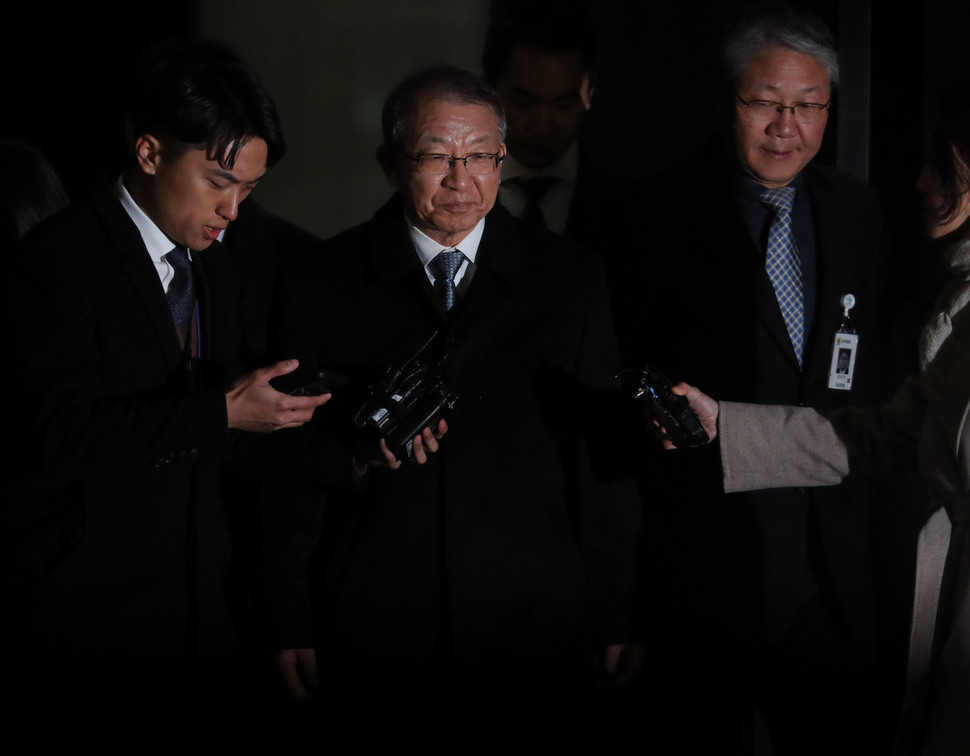 |
|
Former Supreme Court chief justice Yang Seung-tae on the night of Jan. 11 after being questioned at the Seoul Central District Prosecutors’ Office. (Baek So-ah, staff photographer)
|
Analysts speculate over Yang’s thorough review of his questioning report
Former Supreme Court chief justice Yang Seung-tae underwent additional questioning by prosecutors in a closed-door session at 9:30 am on Jan. 14. It was his third time sitting down in the examination room on the 15th floor of the Seoul Central District Prosecutors’ Office, after his first summons for open questioning on Jan. 11 and a voluntary appearance on Jan. 12 to read his suspect report. While the questions during his first appearance concerned accusations of trial interference in cases involving colonial-era forced labor conscription and the drafting of a “judges blacklist,” the office’s team investigating the current judicial scandal, led by Third Deputy Chief Prosecutor of the Seoul Central District Prosecutors’ Office Han Dong-hoon, focused this time on remaining accusations including trial interference to obstruct the Constitutional Court and misappropriation of funds for national court public information office operations. Once again, Yang consistently denied the accusations in his responses to prosecutors on Jan. 14. According to sources, Yang either maintained that he had no recollection of the alleged incidents or responded to statements alleging that he issued orders or reports by insisting that his subordinates had “acted on their own” and that he was “unaware.” He appears likely to voluntarily appear on Jan. 15 to pore over the prosecutor’s interrogation report containing his responses, as he did the day after his first questioning. As before, he is expected to spend a longer time reading over this report than prosecutors spent questioning him. In the case of the report written after his first questioning, Yang spent a full 13 hours reading the document over. While ex-president Park Geun-hye spent seven hours reviewing her report after questioning by prosecutors in 2017 on charges of government influence-peddling, she did not visit prosecutors exclusively to review her report as Yang did. Legal experts offered varying analyses on the reasons behind Yang’s unprecedented two-day long scrutiny of his report. “If he had stated the facts as they stand, he wouldn’t have needed to go over it so closely,” suggested one judge. Another attorney and former judge similarly said, “If he based his statements on his recollections, there wouldn’t be any need for him to look over the report so carefully.” “If he responded strategically and contrary to the facts, he may have had to check whether he slipped up during the long questioning process or whether his responses remained consistent in line with his strategy,” the source speculated. Other analysts suggested he was committing the investigation details to memory ahead of questioning for the validity of an arrest warrant prior to detention. Suspects and their counsel are allowed to take notes during questioning, but cannot take them outside. They are also unable to look at the prosecutors’ investigation records until they are delivered to the trial court. According to some observers, Yang may have been attempting to “refresh his memory” on information evidence and statements acquired by prosecutors ahead of their arrest warrant request. “It looks as though he was using the pretext of ‘scrutinizing the report’ to mentally note the evidence gathered by prosecutors,” said one attorney and former chief prosecutor, adding this “appeared to be in preparation for the upcoming warrant validity review or trial.” Prosecutors plan to make a decision within the week on whether to request an arrest warrant for Yang. By Kim Yang-jin and Lim Jae-woo, staff reporters Please direct comments or questions to [english@hani.co.kr]






